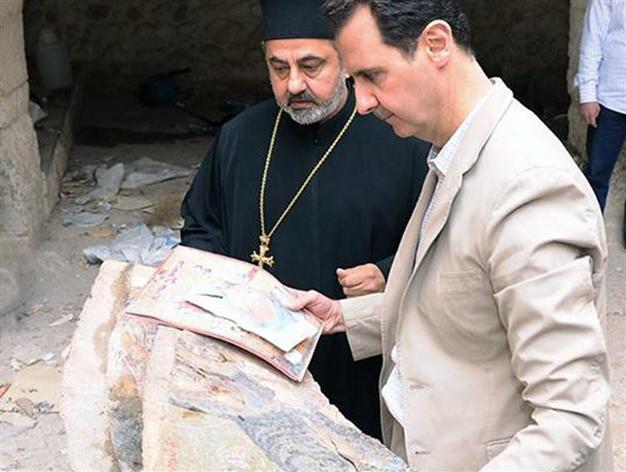Syria's al-Assad visits recaptured Christian town
DAMASCUS - Agence France-Presse

A picture uploaded on the official Facebook page of the Syrian Presidency on April 20, shows Syria's President Bashar al-Assad looking at icons as he visits a monastery in the ancient Christian town of Maalula which his troops recently recaptured from rebels. AFP Photo
Syrian President Bashar al-Assad on Easter April 20 visited the ancient Christian town of Maalula, which his troops recently recaptured from rebels, state television said.
"On the day of the resurrection of Christ, and from the heart of Maalula, President Assad hopes all Syrians have a happy Easter, and for the reestablishment of peace and security throughout Syria," the channel announced in a caption at the bottom of the screen, without showing images of the visit.
It added that al-Assad had inspected the Mar Sarkis (Saint Sergius and Bacchus) monastery, damaged in recent fighting. It said the damage had been caused by "terrorists," using the regime's term for rebels.
"Even the worst terrorists cannot erase our heritage and civilisation," state television quoted al-Assad as saying.
"Like other Syrian sites of heritage and civilisation, Maalula will always resist in the face of the barbarity and obscurantism that are targeting the country."
Founded in the fifth century, the monastery is one of the Middle East's oldest. It is dedicated to two Roman Christian soldiers who were killed by emperor Galerius because of their faith.
The Facebook page of the Syrian presidency posted a picture of al-Assad - who has rarely appeared in public since the uprising began-- standing next to a Christian priest. He held what appeared to be damaged friezes showing the Virgin Mary and Jesus Christ.
Throughout Syria's conflict, the Assad regime has sought to portray itself as the protector of the country's religious minorities against a revolt it says is led by foreign-backed extremists.
The Syrian opposition dismisses such claims as part of a divide-and-rule strategy which is also aimed at deterring the West from providing greater support to the rebels.
Syria's uprising began in March 2011 as a peaceful revolt against the Assad family's four-decade rule but escalated into an insurgency and then a civil war when the regime launched a brutal crackdown.
As the war has intensified, claiming an estimated 150,000 lives, it has also grown more sectarian, with jihadists flocking to the ranks of the Sunni-led rebellion and Lebanon's Shiite Hezbollah movement fighting alongside the regime.
With the backing of Hezbollah's battle-hardened fighters, Syria's army took control of Maalula last Monday.
Located north of Damascus, Maalula is one of the world's oldest Christian settlements, and its inhabitants still speak Aramaic, the language of Christ.
Rebel groups including al-Nusra Front, an al-Qaeda affiliate, had taken control of Maalula in early December. They kidnapped 13 nuns and traded them for women prisoners held in regime jails in March.
Syria's large Christian minority has sought neutrality throughout the three-year war, and has viewed the rise of powerful jihadist groups among the rebels with growing concern.
